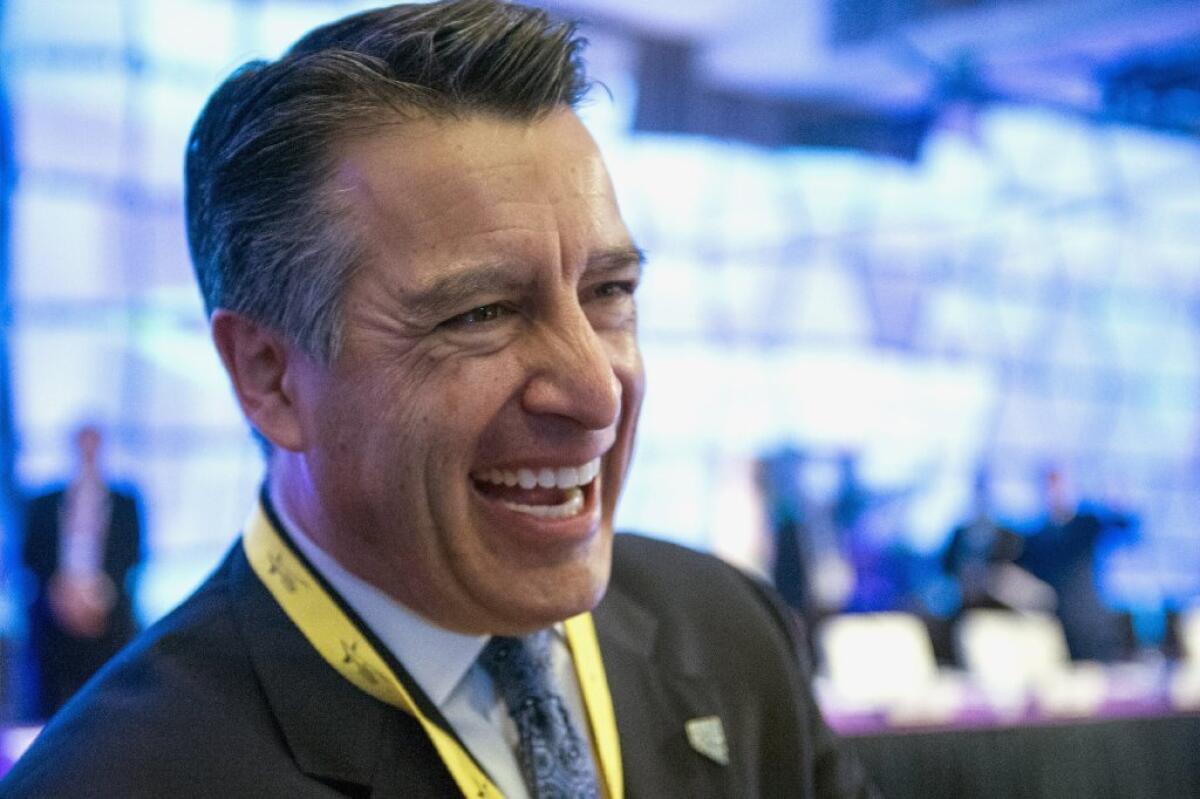Opinion: Is Nevada Gov. Brian Sandoval ‘eminently qualified’ for the Supreme Court? It depends

Nevada Gov. Brian Sandoval at the National Governors Assn. winter meeting in Washington on Feb. 16.
- Share via
Maybe President Obama is seriously considering nominating Nevada Gov. Brian Sandoval, a Republican, to the Supreme Court. Or maybe he’s just messing with GOP senators’ minds by forcing them to say whether their refusal to consider an Obama-named replacement for the late Justice Antonin Scalia would extend to snubbing a fellow Republican.
So far the answer seems to be yes, but that could change if Obama actually nominated Sandoval.
So is the governor is qualified? That could depend on whether he is evaluated by historic criteria for a Supreme Court appointment or more recent standards.
Sandoval’s career has mixed law and politics. As well as serving as governor, he is a former attorney general of Nevada and state legislator and he served four years as a federal district judge, appointed by President George W. Bush on the recommendation of Democratic Sen. Harry Reid, the current Senate minority leader.
Join the conversation on Facebook >>
At earlier points in American history, that resume would be more than adequate for a Supreme Court nominee. The legendary Chief Justice Earl Warren had served as governor of California and some of his colleagues on the bench also had served in elective office. (Justice Hugo Black had been a U.S. senator and Justice Potter Stewart had been elected to the Cincinnati City Council before being appointed a federal appeals court judge.)
But in recent decades Supreme Court justices have tended to come to the nation’s highest bench from lower federal courts — seven sitting justices served on the U.S. Court of Appeals and the eighth, Elena Kagan, is a former U.S. solicitor general, a position sometimes referred to as “the tenth justice.” The last member of the court to have been elected to public office was Justice Sandra Day O’Connor, who retired in 2005. She had served an Arizona state senator.
And the court lacks diversity in other respects, including educational backgrounds. As Adam Liptak of the New York Times has written, that fact was cited by Scalia in his dissent from the court’s 2015 decision legalizing same-sex marriage.
The court, Scalia noted, “consists of only nine men and women, all of them successful lawyers who studied at Harvard or Yale Law School. Four of the nine are natives of New York City. Eight of them grew up in East- and West Coast States. Only one hails from the vast expanse in-between. Not a single South-Westerner or even, to tell the truth, a genuine Westerner (California does not count). Not a single evangelical Christian (a group that comprises about one quarter of Americans), or even a Protestant of any denomination.”
A Justice Sandoval wouldn’t bring religious diversity to the court — he’s a Catholic — but he’s a graduate of a non-Ivy League law school (Ohio State) and a longtime resident of not-quite-coastal Reno (though he was born in California.) Most important, he would bring the experience of a practicing politician to a court whose decisions are often criticized for being clueless about the way the political process works.
These traits make him an attractive candidate. The question is whether his brief judicial experience on a trial court is adequate preparation for service on the Supreme Court — or even for responding to questions from senators.
In a talk at Georgetown University this week, Justice Samuel A. Alito Jr. said: “Given the way the interviews with senators occur beginning immediately on the announcement of the nomination, it’s very difficult for somebody who has not been dealing with the whole breadth of federal law that may come before the Supreme Court to be ready for those interviews.”
The other question is how a Sandoval nomination would be viewed by the American Bar Assn., which tends to place a premium on appellate court experience. In a column he wrote this week for SCOTUSblog, Obama promised that “the person I appoint will be eminently qualified.” That would be a harder claim to defend if Sandoval or some other nominee received anything less than the “well qualified” rating the organization has bestowed on recent appointees to the court.
Follow Michael McGough on Twitter @MichaelMcGough3
More to Read
A cure for the common opinion
Get thought-provoking perspectives with our weekly newsletter.
You may occasionally receive promotional content from the Los Angeles Times.











